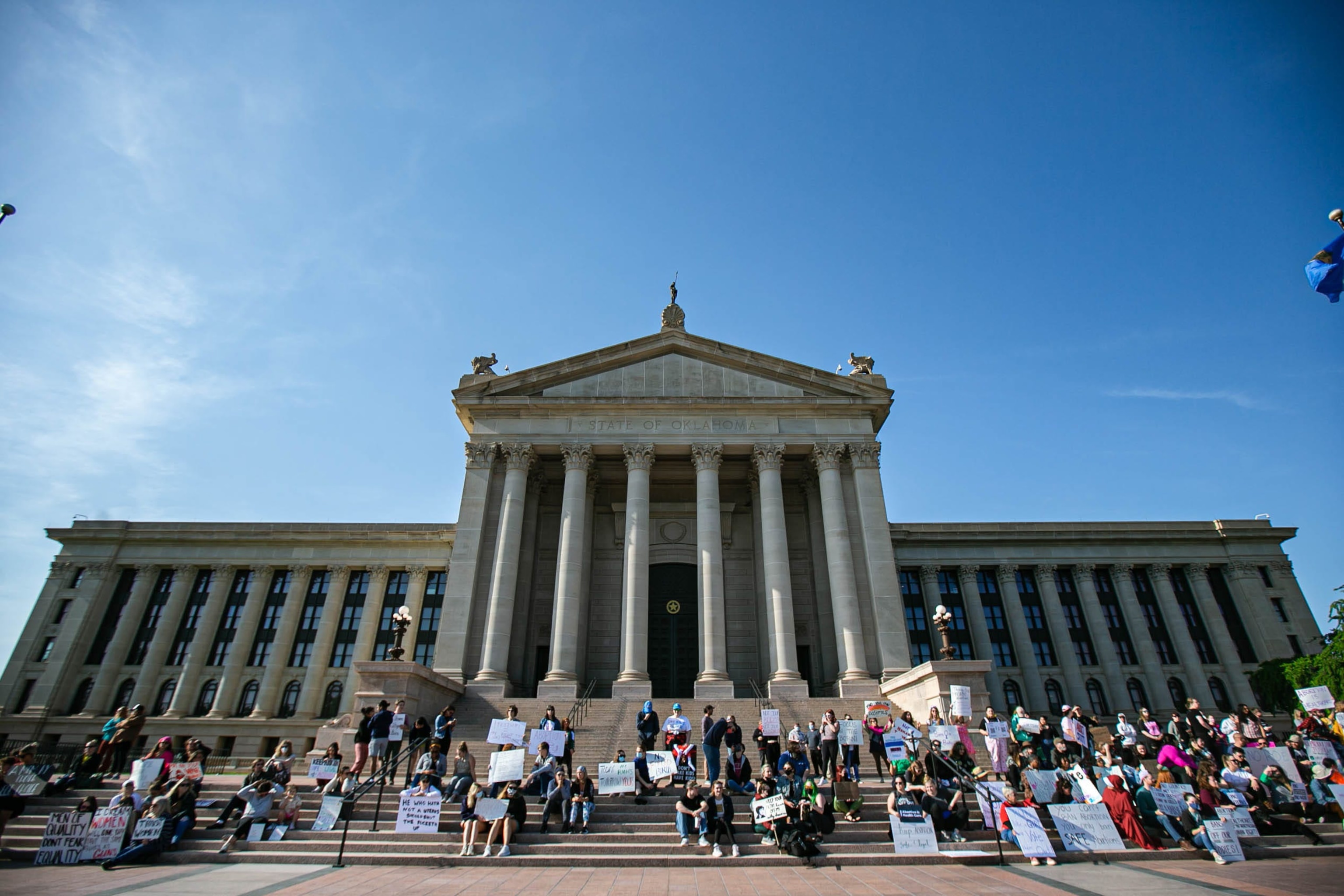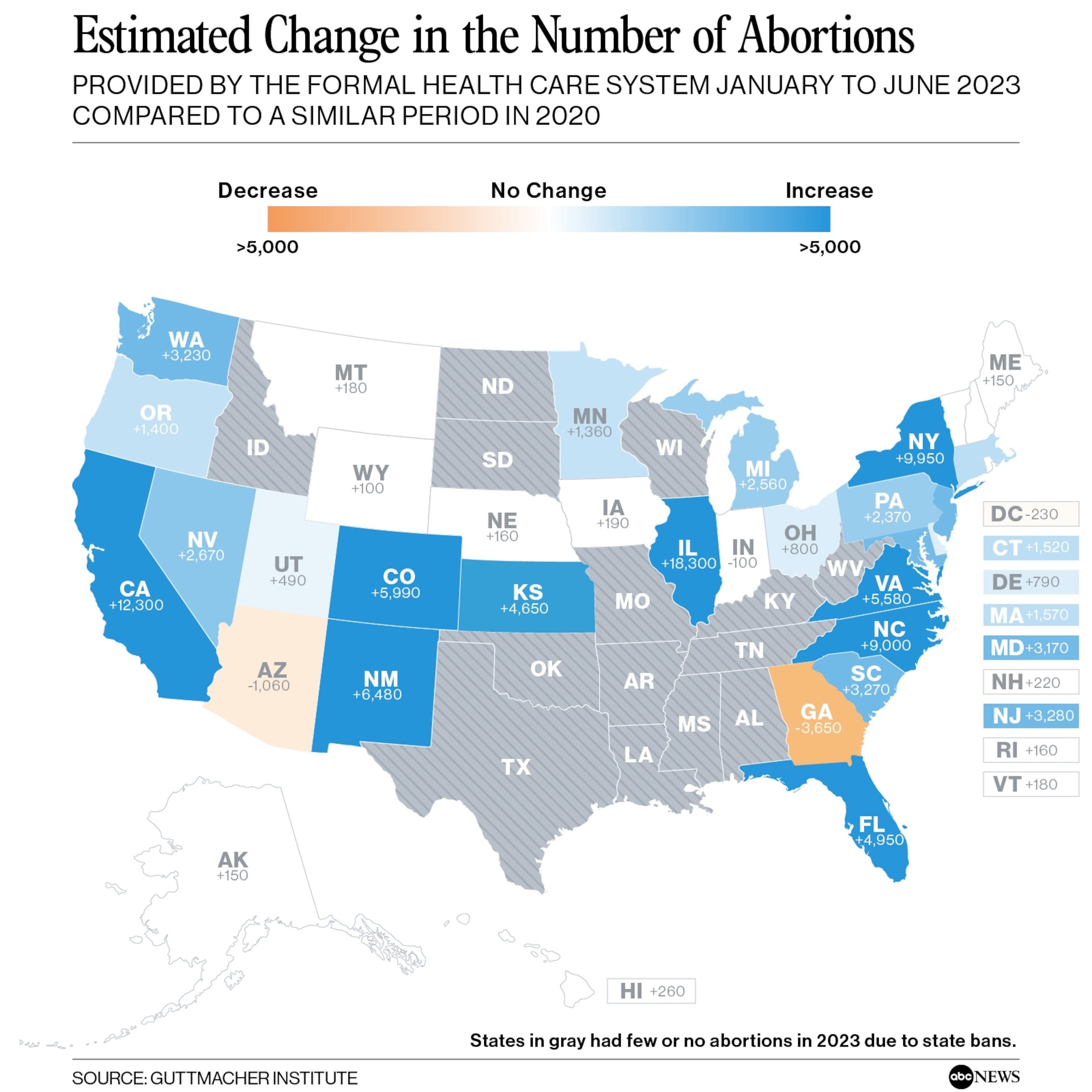Women in Idaho, Oklahoma and Tennessee filed legal actions against their states over abortion bans, saying they were denied abortions despite having dangerous pregnancy complications.
Four women in Idaho -- Jennifer Adkins, Jillaine St.Michel, Kayla Smith and Rebecca Vincen-Brown -- and abortion providers filed a suit against the state, Gov. Brad Little, attorney general and the state's board of medicine, claiming the state's ban has "sown confusion, fear and chaos among the medical community, resulting in grave harms to pregnant patients whose health and safety hang in the balance across the state," according to a copy of the lawsuit shared with ABC News.
Three women in Tennessee -- Nicole Blackmon, Allyson Phillips and Kaitlyn Dulon -- and abortion providers filed a suit against the state, attorney general and the state board of medical examiners, claiming they and others were denied "necessary and potentially life-saving medical care" because physicians "fear the penalties imposed by that ban," according to the lawsuit.

In this May 3, 2022, file photo, demonstrators gather at the Oklahoma State Capitol to protest as the U.S. Supreme Court appears poised to overturn longstanding abortion protections and the Oklahoma governor signs a Texas-style abortion ban.
Nathan J Fish/The Oklahoman via USA Today Network, FILE
Jaci Statton filed an administrative complaint with the U.S. Department of Health and Human Services against a hospital in Oklahoma, claiming she was not provided with an abortion that was a "necessary stabilizing treatment" for her partial molar pregnancy. Statton said she was not provided care when she went to two Oklahoma University Health System facilities and she was told she had to be actively crashing or on the verge of a heart attack before doctors could intervene, according to the complaint.
"They've each been through unthinkable trauma. And today, they are holding their states, their state governments accountable for the suffering that their laws have caused," Nancy Northup, CEO of the CRR, said at a press conference Tuesday.
Physicians in Tennessee -- Heather Maune and Laura Anderson -- and Idaho -- Emily Corrigan, Julie Lyons and the Idaho Academy of Family Physicians -- are also plaintiffs in the lawsuits, filing on behalf of themselves and their patients.
The new lawsuits come months after five women -- represented by the Center for Reproductive Rights -- announced a lawsuit in Texas challenging the state's abortion bans, saying the law puts their lives in danger. More women later joined the suit, bringing the total number of plaintiffs to 15.
"The Supreme Court's unwarranted reversal of Roe v. Wade in the Dobbs case last year has resulted in a health care crisis in states across the nation in those states that have banned abortion -- 14 of them -- including the three states against which we were taking action today -- Tennessee, Oklahoma and Idaho," Northup said.
The new wave of lawsuits and the Texas challenge stand out from previous challenges to abortion bans that were largely filed by OB-GYNs and abortion providers after the U.S. Supreme Court overturned Roe v. Wade, removing federal protections for abortion rights.
In a preliminary injunction hearing in the Texas case, a judge ruled in favor of the women, partially blocking the ban for medical emergencies and fatal fetal diagnoses. The decision was then appealed by the state, putting the injunction on hold for now.
"Today's legal actions seek to ensure that pregnant people with severe pregnancy complications can access abortion care in their home state, and that doctors are given clarity on what situations qualify under the 'medical emergency' exceptions in their state's abortion bans," the Center for Reproductive Rights announced in a statement Tuesday.
"Doctors who violate the bans risk years in prison, hefty fines, and loss of licensure, and have thus been fearful to provide abortion care in many life-threatening circumstances," the CRR said.

Estimated change in the number of abortions Provided by the Formal Health Care System January to June 2023 compared to a similar period in 2020
ABC News / Guttmacher Institute
Idaho lawsuit lead plaintiff
Jennifer Adkins, a 31-year-old mother from Idaho, was at a routine 12-week ultrasound when the scan revealed the fetus had excess fluid and skin edema -- signs of cystic hygroma. She then learned that her fetus likely had Turner syndrome -- a rare condition that results in one of the X chromosomes missing.
Adkins' doctor told her the fetus would not survive and she was surprised Adkins hadn't miscarried already. Adkins was also told that there was a high likelihood that she would develop Mirror syndrome, a condition where the pregnant person develops edema and preeclampsia, which can result in stroke or death. Adkins was told that if the laws in Idaho were different, she would have just been referred to an abortion clinic, but now they were not even sure if they could refer her to a clinic out of the state.
"Even with my health and life at risk, I would not be able to terminate my pregnancy in Idaho," Adkins said Tuesday at a press conference.

In this July 20, 2022, file photo, a protest against the Supreme Court decision to ban abortion, takes place in Boise, Idaho.
Idaho Statesman/TNS via Getty Images, FILE
Adkins began calling clinics in neighboring states.
"We aren't rich and we aren't poor. We knew that we, with all the added travel and medical costs, we would not be able to make our mortgage payment, and we were so grateful for the assistance from family, friends and two abortion funds," Adkins said.
"I only wish I had been able to grieve the loss of my baby at home without all of this added heartache," she added.
Idaho has a six-week ban in place modeled after Texas' abortion law, prohibiting the procedure before most women know they're pregnant.
Little also signed an "abortion trafficking" bill into law in April, criminalizing helping minors travel out of state to receive care.

IN this May 14, 2022, file photo, a member of the national Planned Parenthood association speaks to hundreds gathered near the Tennessee State Capital building in Nashville, Tenn., as part of a nation-wide protest for reproductive rights after a leak from the Supreme Court that suggest Roe v Wade will be overturned.
Seth Herald/AFP via Getty Images, FILE
Dr. Emily Corrigan, an OB-GYN and the head of Idaho's American College of Obstetricians and Gynecologist, who is also a plaintiff in the lawsuit, said she has seen patients being denied care due to the ban.
"Of the 16 years I have worked in this field, this past one has been by far the most difficult because of the laws that Idaho state Legislature has passed," Corrigan said at the press conference.
"Now, there is still widespread confusion in the medical community in Idaho about in which circumstances abortion care is legal. Even one year later, I regularly see patients that have been denied emergency medical care at other hospitals in this state. Similar to Jaci [Statton's] story," Corrigan said.
Corrigan said it has become an impossible situation for patients and physicians.
"It's become too much for many of my colleagues and they have decided to leave. I have hope that the legislature will improve the law. That's why I'm still here, but I have to ask myself every single day if it's worth it to stay here," Corrigan said.
Women in Tennessee
Nicole Blackmon, a 31-year-old living in Tennessee, said she had lost her 14-year-old son in a drive-by shooting just months before she found out she was pregnant.
"We didn't really plan to have another child because I suffered from severe medical issues. So we were really surprised to learn I was pregnant last summer, but felt incredibly blessed to get the news," Blackmon said at a press conference.
She said she stopped taking medication for hypertension and a rare brain condition when she learned she was pregnant to avoid harming her pregnancy
Fifteen weeks into her pregnancy, Blackmon said she learned her baby had a fatal diagnosis. Because she said she could not afford the thousands of dollars it would cost to travel to another state for abortion care, she was forced to continue her pregnancy despite risks to her health. She said she gave birth to a stillborn baby.
According to the lawsuit, Blackmon could feel the baby's organs moving around in her body and each movement was painful
"What we went through was torture that no one else should ever have to face," Blackmon said.
Allie Phillips, 28, and her husband were excited about the birth of their second daughter when they received a fatal diagnosis. At 18 weeks pregnant, the couple said they were told the fetus had multiple anomalies that were incompatible with life. Many of the fetus' organs, including the heart and brain, had not properly developed and her doctor said the fetus' condition would continue to deteriorate and that continuing her pregnancy could pose serious risks to Phillips' health.
Due to Tennessee's ban, Phillips said her doctor told her that she could not offer her any advice on how to access abortion care. After doing their own research, the couple made an appointment at an abortion clinic in New York for the following week. When she arrived she said she learned her baby's heart had stopped beating and she was taken in for emergency care because she was at risk of severe blood clots and infection, including sepsis.
"I went into surgery alone, and I sat in recovery alone. The doctors were kind and compassionate. But I've never met them before. I had to grieve the loss of my daughter in a city I'd never been to, far away from [my 5-year-old daughter], my family and my friends," Phillips said at a press conference.
"Politicians are passing cruel laws against something they know absolutely nothing about," Phillips said at a press conference Tuesday.
Nearly all abortions ceased in Tennessee once a trigger ban went into effect in August 2022, criminalizing providing the procedure. Performing or attempting to perform an abortion is a Class C felony in the state.
Despite claims from politicians, including Gov. Bill Lee, that the ban allows exceptions for pregnancies that threaten a woman's life or could cause serious bodily injury, some doctors told ABC News they believe this is not the case.
The disagreement is over an "affirmative defense" clause in the law that allows physicians being prosecuted over providing an abortion to justify their actions, claiming it was done to prevent death or serious injury. This clause, which lawmakers point to as an exception, only comes into effect during a criminal trial after a physician is charged with the felony and their license has been suspended.
Statton's administrative complaint
After experiencing pain, dizziness and severe nausea, Statton said her OB-GYN told her she had a partial molar pregnancy, which put her health and life at risk. Shortly after, she went to the emergency room with bleeding and severe pain, but despite her serious condition, the hospital did not provide her with an abortion, in this case "stabilizing care," according to the complaint.
"All of the doctors agreed I needed a lifesaving abortion and should receive care under Oklahoma's ban. But the ultrasound tech refused to sign off on the exception. He insisted that he could hear a heartbeat and told the doctors that they could not touch me due to the ban. I remember hearing the doctors pleading with him," Statton said during a press conference.
She was transferred to another hospital within the University of Oklahoma health care system where she said she "begged" staff to perform an abortion, but she was denied care.
"With sympathy, they did tell [my husband] that they couldn't touch me until I was crashing and that I should wait in the parking lot until I was about to die," Statton said.
The couple drove three hours in the middle of a medical emergency to access care in a neighboring state, according to the complaint. The complaint, waged against the two Oklahoma University facilities, claims that when Statton was denied care, the facilities violated federal law, which requires physicians to provide stabilizing care to anyone experiencing a medical emergency.
In a statement, OU Health told ABC News, "Our physicians and staff remain steadfast and committed to providing the highest quality and compassionate care for women of all ages and stages of life. Our healthcare complies with state and federal laws and regulatory compliance standards. Our physicians and staff are aware of and follow state and federal laws."
Oklahoma currently prohibits all abortions except when "necessary to preserve" the life of a pregnant person, under a pre-Roe ban that is in effect.
In May, the Oklahoma Supreme Court struck down two other abortion bans mirroring Texas' SB 8 that were passed in 2022, before Roe was overturned. In its ruling, the court reaffirmed a former decision recognizing the right to abortion in life-threatening situations.
The court ruled that the two bans violate the state's constitution and could prevent care in such circumstances.
from U.S. - Latest - Google News https://ift.tt/ndGczFh
via IFTTT
Tidak ada komentar:
Posting Komentar